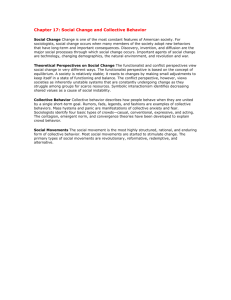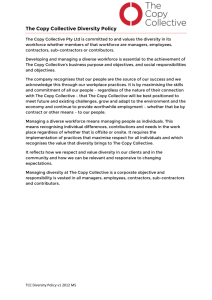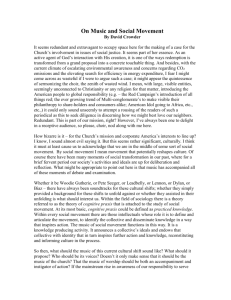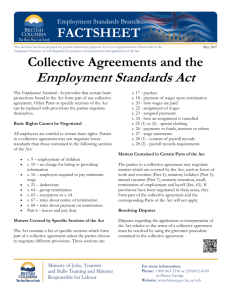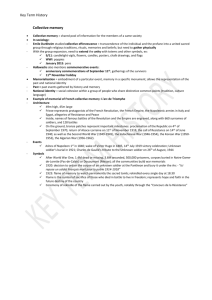Collective Agreements
advertisement
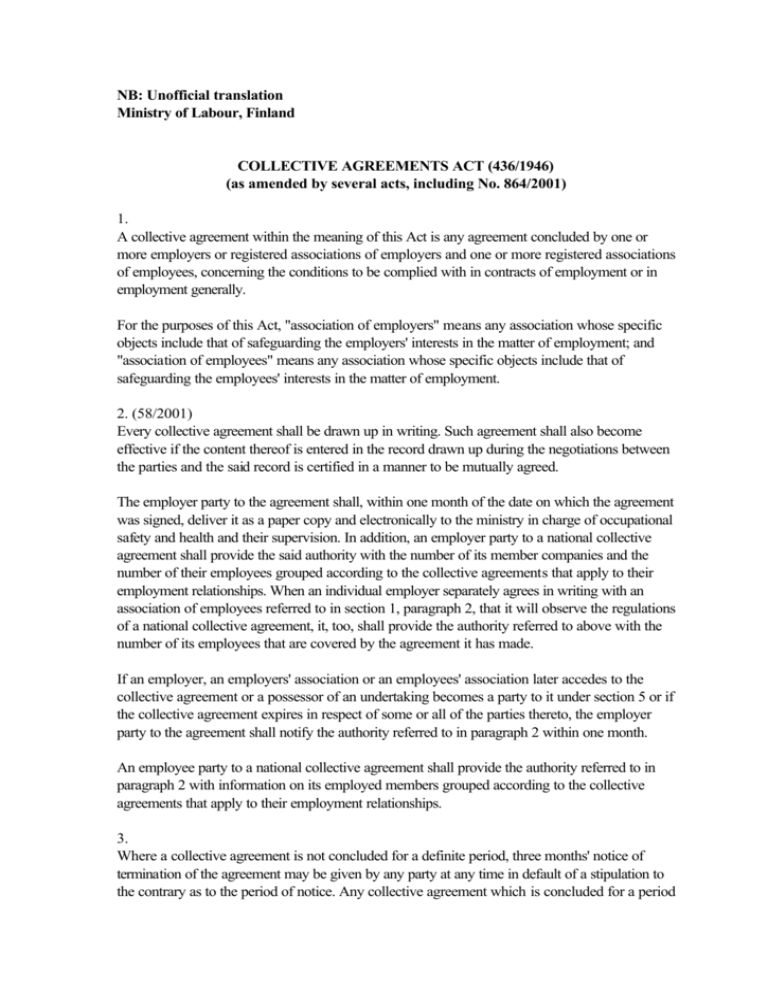
NB: Unofficial translation Ministry of Labour, Finland COLLECTIVE AGREEMENTS ACT (436/1946) (as amended by several acts, including No. 864/2001) 1. A collective agreement within the meaning of this Act is any agreement concluded by one or more employers or registered associations of employers and one or more registered associations of employees, concerning the conditions to be complied with in contracts of employment or in employment generally. For the purposes of this Act, "association of employers" means any association whose specific objects include that of safeguarding the employers' interests in the matter of employment; and "association of employees" means any association whose specific objects include that of safeguarding the employees' interests in the matter of employment. 2. (58/2001) Every collective agreement shall be drawn up in writing. Such agreement shall also become effective if the content thereof is entered in the record drawn up during the negotiations between the parties and the said record is certified in a manner to be mutually agreed. The employer party to the agreement shall, within one month of the date on which the agreement was signed, deliver it as a paper copy and electronically to the ministry in charge of occupational safety and health and their supervision. In addition, an employer party to a national collective agreement shall provide the said authority with the number of its member companies and the number of their employees grouped according to the collective agreements that apply to their employment relationships. When an individual employer separately agrees in writing with an association of employees referred to in section 1, paragraph 2, that it will observe the regulations of a national collective agreement, it, too, shall provide the authority referred to above with the number of its employees that are covered by the agreement it has made. If an employer, an employers' association or an employees' association later accedes to the collective agreement or a possessor of an undertaking becomes a party to it under section 5 or if the collective agreement expires in respect of some or all of the parties thereto, the employer party to the agreement shall notify the authority referred to in paragraph 2 within one month. An employee party to a national collective agreement shall provide the authority referred to in paragraph 2 with information on its employed members grouped according to the collective agreements that apply to their employment relationships. 3. Where a collective agreement is not concluded for a definite period, three months' notice of termination of the agreement may be given by any party at any time in default of a stipulation to the contrary as to the period of notice. Any collective agreement which is concluded for a period 2 of more than four years shall be treated on the expiration of the four years as a collective agreement for an indefinite period. Notice of termination shall be given in writing. 4. A collective agreement shall be binding on 1) the employers and associations who or which concluded the collective agreement or subsequently accede to the agreement in writing and with the consent of the parties; 2) registered associations which are subordinated directly or through one or more intermediaries to the associations mentioned in the preceding point; and 3) employers and employees who are, or during the period of the agreement were members of an association bound by the agreement; and the said employers and employees shall be required to observe the provisions of the collective agreement in all contracts of employment concluded between them. Similarly, an employer bound by a collective agreement shall not conclude, within the area covered by the agreement, any contract of employment containing clauses which are at variance with the collective agreement with an employee who, though not bound by the said agreement, performs work covered by the collective agreement. The provisions of the first and second paragraphs shall not, however, apply to any association, employer or employee which or who is bound by an earlier collective agreement containing other conditions, or in so far as the scope of operation of a collective agreement is limited in the agreement itself. 5. If the possessor of an undertaking was a party to, or was otherwise bound by a collective agreement, his successor shall take over all the rights and obligations of the former possessor under the collective agreement. 6. Where any part of a contract of employment is at variance with a collective agreement applicable thereto, such part of the contract of employment shall be invalid and superseded by the corresponding provisions of the collective agreement. 7. If any employer or employee bound by a collective agreement wittingly violates, or should reasonably have known that he violates, any provision in the said agreement, he may be ordered to pay a compensatory fine not exceeding EUR 23,500 in the case of an employer and not exceeding EUR 230 in the case of an employee (864/2001). The compensatory fine may be repeated until the circumstances which are contrary to the collective agreement cease to exist. 3 The above provisions may be excluded or varied in the collective agreement. 8. A collective agreement shall bind all employers and associations who and which are parties thereto or otherwise bound thereby, and likewise any associations whose members or subordinate associations mentioned in point 2 of the first paragraph of section 4 have concluded the agreement with the consent of the association, to refrain from any hostile action directed against the collective agreement as a whole or against any particular provisions thereof. Furthermore, the associations which are bound by the agreement shall be required to ensure that the associations, employers and employees subordinated to them and covered by the agreement refrain from any such hostile action and that they do not contravene the provisions of the collective agreement in any other manner. An association which is party to a collective agreement is regarded to have failed to fulfil its supervisory duty referred to in paragraph 1 if a clear and undisputed provision of the collective agreement has not been applied in accordance with the unanimous opinion of the associations which are parties to the agreement and if, taking account of the circumstances, the incorrect application is not adjusted quickly, when the association has received knowledge of it. (660/1984) 9. An association and employer, party to the collective agreement or otherwise bound by it, which does not fulfil its responsibilities under the agreement, as referred to in section 8, shall, unless otherwise stipulated in the collective agreement, pay a compensatory fine in lieu of damages. This fine may not exceed EUR 23,500. (864/2001) If the contravention of the provisions of the collective agreement consists in the fact that a money payment provided for in the agreement was not made, the offender may also be required to pay the amount due. 10. (424/1986) When a compensatory fine is imposed, all the facts which have emerged, such as the extent of the damage, the degree of guilt, any cause given by the other party to the violation and the size of the association or undertaking, shall be taken into account. For a special reason, it shall be possible to refrain from imposing a compensatory fine. Unless otherwise prescribed in the collective agreement, the compensatory fine imposed shall go to the injured party, if property loss has occurred, but otherwise to the party upon whose claim the judgment has been given. If there are several parties entitled to the amount of compensation, the judgment shall determine, taking account of the extent of the loss suffered by each of them or their members and those represented, how the compensation imposed shall be divided among the parties mentioned. 11. 4 Where the provisions of a collective agreement have been disregarded to such a material degree that the other parties bound thereby cannot reasonably be required to continue to abide by the agreement, the said agreement may forthwith be declared to be no longer binding. If there are two or more parties on either side to a collective agreement and the said agreement is declared to be no longer binding as a result of proceedings brought against any one of them, it may be also terminated against the remainder by giving them notice within two weeks. If a collective agreement is declared to be no longer binding and if there is another party to the agreement on the same side as the party who instituted proceedings, the said party shall be entitled to give notice of termination of the agreement within two weeks. Any agreement in respect of which notice is thus given shall forthwith cease to have effect. 12. Every employer who is bound by a collective agreement shall post up a copy thereof in the workplace. 13. If any employer fails to discharge the obligations imposed upon him under section 12, he shall be liable to a fine [not exceeding ten day-fines]1. 13 a. (864/2001) The monetary amounts referred to in sections 7 and 9 above shall be revised by decree at threeyear intervals to correspond to any changes in monetary value. 14. This Act shall come into operation on 1 July 1946, and the Act of 22 March 1924 respecting collective agreements (No. 88 of 1924) is thereby repealed. 1 The special upper limit of ten day-fines has been removed. See Criminal Code, chapter 2, section 4, as amended.

